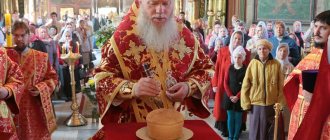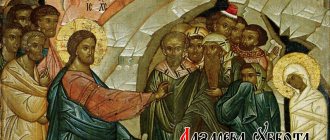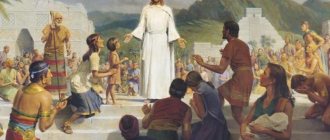Week of the Publican and Pharisee in 2022
Before Lent, Orthodox Christians celebrate three preparatory weeks, also known as Weeks. Traditionally, they begin on Church Day - Sunday.
First Week from February 14 to February 20 - “The Week of the Publican and the Pharisee”;
The second will begin on the 21st and will last until February 28 - “The Week of the Prodigal Son”;
The third is “The Week of the Last Judgment” from March 29 to March 6.
During the holiday week, fasting is not held on Wednesday and Friday, which is why it is called “continuous week.” The date of its celebration changes every year. It directly depends on the timing of Lent.
Characters
First of all, we need to understand who is a tax collector and who is a Pharisee.
The publican, if we look for correspondences to him in our time, is most similar to the current collector: he was a person who bought debts and tax obligations of the population from the state and then collected these debts from the population with interest, using gangster methods.
And a Pharisee is roughly the current active parishioner: a person who regularly visits the temple, prays according to the rules, convinced that faith is the center of human life and one must live according to the laws and regulations defined by the Holy Scriptures.
I believe that if we remember this, the parable will seem much more ambiguous to us than when we read it with blurry eyes, when we remember not the original meaning of the words, but only those meanings that the words developed on the basis of this parable.
They say this parable is about pride and the humiliation of the proud. Perhaps she talks about this too - but not only about this. And perhaps she doesn't talk about it the way (or the way) we think.
Who are the publicans and Pharisees in the Bible?
The meanings of the words “Pharisee” and “Publican” are descriptions of a bad person. This is known to everyone who is familiar with this story. The only difference between them is that Jesus scolded some, but, on the contrary, felt sympathy for others.
The fact is that in the Gospel the Pharisees are those who often argue with the Savior and object to his words. They believe that they are more obedient to the commandments and elevate themselves above others. Common people often mistook them for teachers because of their righteous lifestyle.
Jesus Christ always called out their hypocrisy and scolded them for misinterpreting the word of God, which they considered a threat to their spiritual authority. But despite their error, among the Pharisees there were those who sincerely tried to please the Lord. That is why the Savior opened their souls in order to save those who pursued a good goal with their wrong deeds.
Publicans were servants of the Romans who took over the land of Israel. Local Jews were hired as tax collectors to collect taxes from their fellow countrymen. In addition to taxes, the traitors made their own profit. They could easily take away the last thing from the poor or leave a mother with a child penniless.
Those in the service of the Romans were considered enemies of the people, hated outcasts with whom they disdained even to speak. But people were too afraid of them to resist.
But Jesus never divided people into good and evil. Publicans, along with others, had the right to repent before God. For their sincerity, many were often forgiven their sins.
Parable of the Publican and the Pharisee: “Those who exalt themselves will be humiliated”
Parables are one of the main distinguishing features of the Gospel. Through them, Jesus communicated with the people about pride, about conflicts and about reconciliation. Despite the fact that these short stories were voiced more than two thousand years ago, they still resonate in the hearts of modern people and excite their guts.
A brief summary of the parable that is read during the holiday week at the liturgy:
Christ says:
“Two men entered the temple to pray, one a Pharisee and the other a tax collector. The Pharisee, standing, prayed to himself like this: “God! I thank You that I am not like other people, robbers, offenders, adulterers, or this tax collector. I fast twice a week and give a tenth of everything I acquire.” The publican, standing in the distance, did not even dare to raise his eyes to heaven, but, striking himself on the chest, said: “God! Be merciful to me, a sinner!” “I tell you,” Christ ends this parable, “that the tax collector went to his house justified rather than the other: for everyone who exalts himself will be humbled, and he who humbles himself will be exalted.”
What does the publican ask for?
The publican asks the Lord for reconciliation (this is the intended meaning of the verb ʻιλάσκομαι used here: to propitiate in order to restore peace). That is, he does not ask for anything specific - he asks only to come into contact with God again. That the certainty of him, which he created with his sins and which hangs over him like a coffin lid, shielding him from the sky, would be removed - and the field of possibilities would open up for him again.
The Pharisee thanks for the fact that he is perfect, that is, completed, but the publican asks for the opportunity to begin.
Interpretation (meaning of the parable)
The short story is addressed to people who try to elevate themselves by putting others down.
It becomes clear that the Pharisee is not praying, but talking about his merits and successes. Instead of sympathizing with the publican for his sinful fall, he, on the contrary, is glad that he looks better in comparison. The second one came to repent. He asks for mercy and does not even dare to turn his gaze to heaven, as is appropriate for Jewish prayer. The man understands how sinful he is and suffers from it.
The meaning of the parable that the Lord brought to his listeners is that the exalted will be humiliated, and those who humiliate themselves will be exalted.
Many do not entirely agree with the message of the parable. There was a popular proverb: “If only two people went to heaven, one of them would be a Pharisee.” And, indeed, one cannot call him a bad person.
What is the Pharisee asking for?
Amazingly, he doesn’t ask for anything! His prayer is a prayer of thanksgiving, not a prayer of need; apparently he is praying the most perfect of prayers. And he does not take credit for his merits and his perfect life - he attributes the merit of the fact that he fulfills everything commanded entirely to God. He feels like a favorite of God, created differently from other people who are mired in sins and do not keep the law. The Pharisee fulfills even more than the law and regulations require: he fasts more than what is commanded and gives more than the law requires, according to which tithes were levied only on crops and livestock (and not on everything purchased). The Pharisee appears here as a thing that has completely, and even with a slight excess, filled its boundaries, occupied its allotted limits, and has been fully realized. A thing with which its Creator seems to have nothing else to do.
Prayer of the Pharisee and the Publican
God, be merciful to me, a sinner. Extended triple version:
God, be merciful, wake me a sinner (1st bow) God, cleanse me, a sinner, and have mercy on me (2nd bow) Who created me, Lord, forgive me! (3rd bow) In Russian: God, be merciful to me, a sinner, You created me, Lord, You have mercy on me, It is impossible to count my sins, but have mercy on me, Lord, and forgive me, a sinner.
Kontakion
Let us flee from the lofty speech of the Pharisees, and let us learn from the publicans the lofty verb of the humble, crying out in repentance: Savior of the world, cleanse Thy servants.
Kontakion 2nd
Let us bring sighs to the publican Lord, and let us sinners approach Him as the Lord: He wants the salvation of all people, and He grants forgiveness to all who repent. For the sake of our incarnation, God is co-eternal with the Father.
Troparion
With the depth of wisdom, build everything humanely / and give what is useful to everyone, / To the One Creator, rest, O Lord, the souls of Thy servant, / having placed their trust in Thee, / Creator and Maker and our God. Glory, even now, to the Mother of God: To you and the Wall, and the Refuge of the Imam, / and the Prayer Book, favored by God, / Whom you gave birth to, the brideless Mother of God, salvation of the faithful.
Who are publicans?
Publicans were tax collectors who were hired; they were not loved in Judea, which at the time of Jesus Christ was a province of the Roman Empire. Publicans, wanting to get rich, took away the last things in the family, just to give it to the Roman Caesar. They were also forced to constantly communicate with pagans, which for the Jews was considered desecration.
Publicans were rich, but a cursed people, so usually people who did not sympathize with others and lived without moral values agreed to this work.
However, in Christ’s parable, the publican behaves completely differently.
So, he comes to the temple, which was not usually practiced among tax collectors. In addition, in the temple of publicans he behaved very strangely: “he stood at a distance.” “He did not even dare to raise his eyes to the sky; but, striking himself on the chest, he said: “God, be merciful to me, a sinner!”
Sermon of the day
The humble will be exalted, and those who exalt themselves will be humbled.
(Luke 18:14).
To some people who were confident about themselves that they were righteous, and humiliated others, Jesus Christ spoke the following parable. Two people entered the temple to pray: one was a Pharisee, and the other was a tax collector. The Pharisee stood up and prayed to himself like this: God! I thank You that I am not like other people, robbers, offenders, adulterers, or like this tax collector. I fast twice a week and give a tenth of everything I acquire. The publican, standing at a distance, did not even dare to raise his eyes to heaven, but, striking himself on the chest, said: God, be merciful to me, a sinner! And further Jesus Christ adds that this one went to his house justified more than the other, for everyone who exalts himself will be humbled, and he who humbles himself will be exalted (see: Luke 18:10-14).
So, this is what it means to boast about yourself, but to speak bad things about others, to humiliate others! Look at this Pharisee praying in the temple of God. He did not take anything from anyone, did not offend anyone in any way, led a chaste life, fasted twice a week, and gave a tenth of his estate to the church and to the poor. Who will not say that this Pharisee is a righteous man? However, it was not he who went justified to his house, but the publican. Yes, this virtuous Pharisee lost all his virtues by boasting about himself and saying about the publican that he was a bad man.
But look at this publican praying in the temple of God. Look how he stands away from everyone, how he beats his chest, how he lowers his gaze; it is clear from everything that he is a great sinner. However, this great sinner went home justified. Yes, this great sinner is justified because he condemned himself, recognized himself as the sinner that he really was. Let us not, listeners, say bad things about others and boast about ourselves. To boast about oneself means to humiliate oneself. Both God and people will stop loving the one who decides to boast about himself. Our good deeds cease to be good when we boast about them. We lose the proper reward for our labors when we complacently tell everyone about them.
Equally, humiliating others means humiliating yourself. We ourselves become low before God and people when we speak lowly of our neighbor; We dishonor ourselves when we denigrate the honor of others. And how can we say bad things about others? How long will it take for a thin person to become better than us? How long will it take for him to correct himself and receive justification from God? How long will it take him and the publican to say: God, be merciful to me a sinner? We see and hear that this man offends, robs, and lives dissolutely. But do we see, but do we hear how he beats his sinful chest, how he cries about his sins before God? We know how he sins every day, how he commits injustice every hour. But do we know that at the very time we condemn him, he, perhaps, on his knees, covered in tears, stands before the merciful God and prays from the depths of his soul: God, be merciful to me, a sinner? Perhaps at that very moment when we say that this person did this, that, the third, - at that very moment God says to him: I forgive you this, and that, and the third, and I forgive you everything. So, listeners, we perhaps condemn our neighbor at the very time when God justifies him at His righteous judgment. Let us remember that even the lowest sinners are not far from deep humility, for everyone who exalts himself will be humiliated, and he who humiliates himself will be exalted.
How to properly prepare for Lent
The meaning of Great Lent for the Orthodox is repentance of sins in order to celebrate Easter/Bright Sunday with a pure soul and thoughts. Fasting involves limiting the consumption of certain foods (for example, meat, milk, eggs) on certain days. Entertainment is contraindicated on these days.
During the four-week period before Lent, the church prepares believers for abstinence. During the Week of the Publican and the Pharisee, there are no restrictions on products or food intake. Starting next week, fasts on Wednesday and Friday will be restored. During the meat-free week, one is supposed to abstain from meat. In the last week (cheese day or Maslenitsa) it is allowed to consume milk, cheese, butter, eggs, but it is required to fast until the evening on Wednesday and Friday.
On the Week of the Publican and the Pharisee, the Orthodox Church reminds believers of the essence of religion: humility before God.
Without humility, true repentance for sins is impossible. The source of sinful deeds and thoughts is the pride of a person who considers himself equal to God. The order of services on these days is determined in the Lenten Triodion.
In the second week at the liturgy they read the parable of the prodigal son, in the third - about the Last Judgment, in the fourth - they remember the saints who became famous for the feat of fasting, the sin of Adam and Eve and expulsion from Paradise. Remembering the prodigal son, the church says that any sinner can count on God’s mercy if his humble repentance is sincere.
On Saturday of Meat Week, the dead are remembered at a service (Ecumenical Parental Saturday).
The Church prays especially for those who left the earthly world without a funeral service:
- died in a disaster;
- at war;
- from violence;
- sudden illness.
The reminder of the final judgment should warn people against careless sinfulness, since no one knows the day when he will appear before the Lord. On the last Sunday before Lent, believers are called upon to follow the rules of abstinence, reminding them that the sin of their forefathers was due to intemperance.










